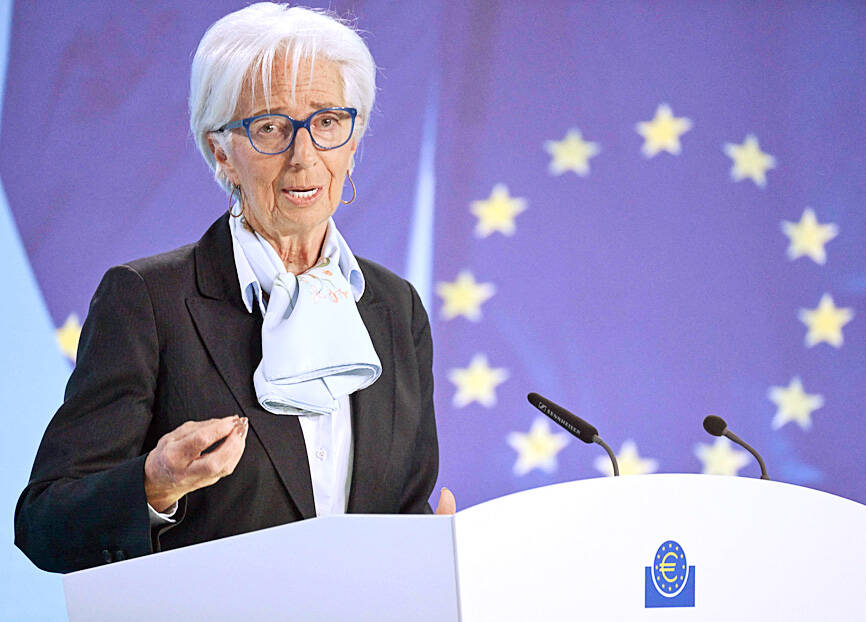Europe’s economy is nearing the end of a malaise that has resulted in more than a year of near stagnation, European Central Bank (ECB) President Christine Lagarde said on Wednesday.
Output in the eurozone is “recovering and we are clearly seeing signs of recovery,” Lagarde told the Council on Foreign Relations in Washington. “We haven’t had a recession, but it’s been very, very slow and meager, [but] you have an employment and a job market which is phenomenal.”
The ECB is almost certain to cut interest rates at its next meeting in June — offering some support for growth — although what happens after that is increasingly uncertain.

Photo: AFP
That is in part because of the US Federal Reserve, whose chair Jerome Powell on Tuesday signaled that officials would wait longer than previously anticipated to reduce borrowing costs following a series of surprisingly high inflation readings.
A prolonged period of monetary easing in Europe with the US not acting to the same extent could dent the euro, with Lagarde saying officials would watch fluctuations “very carefully,” despite not targeting a particular level.
“While we have a single mandate with a primary objective of price stability, obviously we have to take into account the impact that exchange-rate variations will have on our inflation,” she said. “That movement of currencies may have an impact on inflation by way of imported inflation.”
Tensions in the Middle East are another risk factor, she added.
From supply-chain disruptions following the COVID-19 pandemic to an energy crisis after Russia’s invasion of Ukraine, Europe’s economy has faced multiple challenges, but it mignt yet face its biggest — the clean energy and digital transitions that Brussels has made its priority in the coming years would require additional annual investment of nearly 620 billion euros (US$660 billion).
From artificial intelligence to solar panels, from computer chips to batteries, the EU is fast losing ground on innovation to other global powers.
The EU has been put further on the back foot as China and the US have plowed billions of dollars of state aid to prop up their critical industries.
What is needed is “radical change,” former ECB president Mario Draghi said during a speech in Belgium on Tuesday, pointing to “other regions [that] are no longer playing by the rules.”
“Our major competitors are taking advantage of the fact that they are continental-sized economies. We have the same natural size advantage in Europe, but fragmentation is holding us back,” Draghi said.
The former Italian prime minister, increasingly touted as a potential successor to Ursula von der Leyen as European Commission president, is to present a report on the issue in the summer.
Additional reporting by AFP

The US dollar was trading at NT$29.7 at 10am today on the Taipei Foreign Exchange, as the New Taiwan dollar gained NT$1.364 from the previous close last week. The NT dollar continued to rise today, after surging 3.07 percent on Friday. After opening at NT$30.91, the NT dollar gained more than NT$1 in just 15 minutes, briefly passing the NT$30 mark. Before the US Department of the Treasury's semi-annual currency report came out, expectations that the NT dollar would keep rising were already building. The NT dollar on Friday closed at NT$31.064, up by NT$0.953 — a 3.07 percent single-day gain. Today,

‘SHORT TERM’: The local currency would likely remain strong in the near term, driven by anticipated US trade pressure, capital inflows and expectations of a US Fed rate cut The US dollar is expected to fall below NT$30 in the near term, as traders anticipate increased pressure from Washington for Taiwan to allow the New Taiwan dollar to appreciate, Cathay United Bank (國泰世華銀行) chief economist Lin Chi-chao (林啟超) said. Following a sharp drop in the greenback against the NT dollar on Friday, Lin told the Central News Agency that the local currency is likely to remain strong in the short term, driven in part by market psychology surrounding anticipated US policy pressure. On Friday, the US dollar fell NT$0.953, or 3.07 percent, closing at NT$31.064 — its lowest level since Jan.

The New Taiwan dollar and Taiwanese stocks surged on signs that trade tensions between the world’s top two economies might start easing and as US tech earnings boosted the outlook of the nation’s semiconductor exports. The NT dollar strengthened as much as 3.8 percent versus the US dollar to 30.815, the biggest intraday gain since January 2011, closing at NT$31.064. The benchmark TAIEX jumped 2.73 percent to outperform the region’s equity gauges. Outlook for global trade improved after China said it is assessing possible trade talks with the US, providing a boost for the nation’s currency and shares. As the NT dollar

The Financial Supervisory Commission (FSC) yesterday met with some of the nation’s largest insurance companies as a skyrocketing New Taiwan dollar piles pressure on their hundreds of billions of dollars in US bond investments. The commission has asked some life insurance firms, among the biggest Asian holders of US debt, to discuss how the rapidly strengthening NT dollar has impacted their operations, people familiar with the matter said. The meeting took place as the NT dollar jumped as much as 5 percent yesterday, its biggest intraday gain in more than three decades. The local currency surged as exporters rushed to